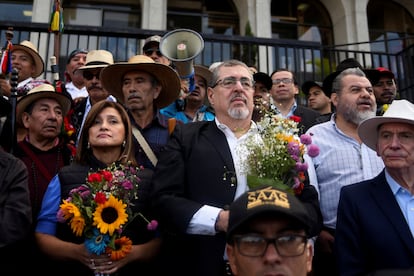Backing Bernardo Arévalo: Constitutional Court of Guatemala issues order to guarantee his inauguration
The decision by the highest court of justice will contain, for now at least, repeated attempts by the attorney general’s office to reverse the election victory of the president-elect


The Constitutional Court of Guatemala on Thursday issued an order to stop the attempts by the attorney general’s office, led by Consuelo Porras, to prevent the inauguration of the president-elect, Bernardo Arévalo, and his running mate Karin Herrera. The highest court of the Central American country urged Congress to “materialize” the inauguration of “every elected official in the 2023 electoral process.” The decision has been issued a month before the scheduled transfer of power, which is in jeopardy due to reiterated attempts by prosecutors to strike down the Semilla (Seed) Movement, the party of the new president that has been facing an onslaught of legal challenges.
In reaching its decision, the court analyzed a request for protection filed by a group of lawyers led by constitutionalist lawyer Edgar Ortiz Romero, who demanded that the court guarantee democracy in Guatemala, where they see a possibility that “the popular will will be disobeyed” as expressed at the last elections.
“Today is a historic day for Guatemalan democracy. The Court has granted us definitive protection, endorsing that on January 14, 2024 there must be a transition of government, and both the elected duo and the elected lawmakers must assume their positions,” said Ortiz Romero following news of the court’s decision.
The attorney general’s office, resorting to a whole series of court cases, is trying to delegitimize the results of the Guatemalan runoff on August 20, when the progressive Arévalo won the elections with 58% of the vote. The victory of the Semilla Movement delivered a forceful citizen message against the corruption and impunity that prevails in Guatemala, specifically against the so-called “pact of the corrupt,” made up of a group of politicians, members of the military, businesspeople and individuals linked to drug trafficking who have co-opted most of the state institutions since 2019, when they managed to kick out the International Commission Against Impunity in Guatemala (CICIG), a United Nations body that dismantled more than 200 corrupt structures.
Since Arévalo won the elections, prosecutors have also attacked the Supreme Electoral Tribunal. On December 8, the attorney general’s office asked to annul the elections due to alleged “administrative irregularities of the electoral body.” The electoral magistrate, Blanca Alfaro, classified the request as “a breach of the constitutional order.” The president-elect has insisted that Attorney General Consuelo Porras and her office are carrying out a “coup d’état” against him along with “other corrupt actors.”
The Constitutional Court, after much national and international pressure on Guatemalan authorities to guarantee the orderly transfer of power, highlighted in its decision that Congress and its board should not ignore the results of the elections.
“Congress is urged to preserve the democratic regime of the State, observe the values of justice, security and peace, observing that, imperatively, the renewal of the members of the Legislative Branch and the Executive Branch is carried out on January 14, 2024, the date provided for in the Constitution, with the people elected according to the results endorsed by the Supreme Electoral Tribunal, seeking the materialization of national unity, of the interests of the Guatemalan population, through a peaceful transition process,“ reads the order.
Ortiz Romero noted that the decision emphasizes the autonomy of the attorney general’s office, “but makes it completely clear that its investigations cannot prevent the completion of the electoral process, which culminates with the inauguration of elected officials.”
Giammattei, “interference” and international pressure
The court also urges the outgoing president, Alejandro Giammattei, to “promote national unity and the completion of the transitional process.” This Tuesday, the outgoing president released a letter in which he assured that there is no “action” that prevents Arévalo from assuming power. However, Giammattei has been criticized for doing nothing to stop the attorney general’s blows against the electoral process.
Instead, in his letter, Giammattei criticized the United States for the sanctions it has imposed on officials, including prosecutors, for attacking democracy. The president accused Washington of “interference.” He attacked “the media and political manipulation of some members of the United States Government against Guatemala, to the detriment of a good bilateral relationship.”
Although he did not mention it specifically, the president’s remarks alluded to the withdrawal of visas for more than a hundred Guatemalan lawmakers ordered last Monday by the Biden administration for “undermining democracy.” According to the State Department, the Guatemalan attorney general’s office is carrying out “antidemocratic actions” against the president-elect, as evidenced by the arrest warrants against electoral officials, the request to withdraw Arévalo’s judicial immunity and the attempt to annul the election results.
Other Latin American nations, including Chile and Costa Rica, have shown support for president-elect Arévalo. The Organization of American States (OAS) also condemned the actions of Porras’ office.
Sign up for our weekly newsletter to get more English-language news coverage from EL PAÍS USA Edition
Tu suscripción se está usando en otro dispositivo
¿Quieres añadir otro usuario a tu suscripción?
Si continúas leyendo en este dispositivo, no se podrá leer en el otro.
FlechaTu suscripción se está usando en otro dispositivo y solo puedes acceder a EL PAÍS desde un dispositivo a la vez.
Si quieres compartir tu cuenta, cambia tu suscripción a la modalidad Premium, así podrás añadir otro usuario. Cada uno accederá con su propia cuenta de email, lo que os permitirá personalizar vuestra experiencia en EL PAÍS.
¿Tienes una suscripción de empresa? Accede aquí para contratar más cuentas.
En el caso de no saber quién está usando tu cuenta, te recomendamos cambiar tu contraseña aquí.
Si decides continuar compartiendo tu cuenta, este mensaje se mostrará en tu dispositivo y en el de la otra persona que está usando tu cuenta de forma indefinida, afectando a tu experiencia de lectura. Puedes consultar aquí los términos y condiciones de la suscripción digital.








































